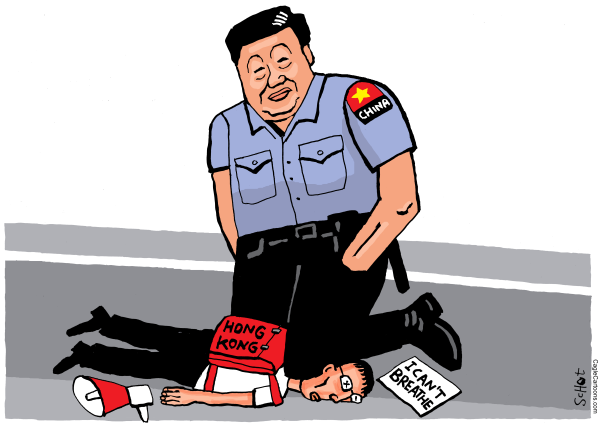
Police in riot gear swarmed the Causeway Bay shopping district, firing pepper spray, tear gas, and rubber bullets into a crowd of Hong Kong residents protesting the legislation. They deployed water cannons to disperse the marchers and drown out their chants.
At least 370 people were arrested, including a 15-year-old girl. Under the new law, anyone convicted of "acts of secession, subversion of state power, terrorist activities, and collusion with foreign or external forces" — i.e., of openly dissenting from China's totalitarian control — faces a potential maximum sentence of life in prison.
No less insidious than what the new law allows Chinese authorities to do to dissidents — warrantless searches, secret trials, seizure of assets — is the censorship it is driving Hong Kongers to impose on themselves. Many activists have deleted their social-media accounts. Writers have asked websites to take down their published articles. Demosisto, the most prominent pro-democracy youth group, has disbanded. Libraries are pulling books critical of China's communist government.
As civil liberties and human rights die in Hong Kong, China's brutality is being condemned in the free world. In Washington, for example, the House and Senate voted unanimously to enforce new sanctions on any Chinese officials involved in destroying Hong Kong's autonomy. British Prime Minister Boris Johnson, castigating China's new law, announced a policy making millions of Hong Kong citizens eligible to emigrate to Britain. Amnesty International denounced the new Chinese measure as a "weapon of repression" designed to "govern Hong Kong through fear."
But from the United Nations Human Rights Council — the international agency whose mission is the "protection of all human rights and fundamental freedoms" — there has been no rebuke. Far from it: At a meeting of the council on the day Beijing adopted the harsh new law, 53 countries openly supported China's crackdown on Hong Kong, twice as many as those that came out against it. Among the governments backing China were some of the most notorious dictatorships on earth, including North Korea, Syria, Iran, and Equatorial Guinea. Their spokesman was the delegate from Cuba, itself an egregious human-rights violator and the oldest dictatorship in the Western Hemisphere.
"In any country, the legislative power on national security issues rests with the State, which in essence is not a human rights issue," declared the Cuban representative on behalf of China's defenders. "Hong Kong affairs are China's internal affairs that brook no interference by foreign forces." The notion that China's obliteration of civil liberties and political freedoms in Hong Kong "is not a human rights issue" is nonsensical, but only 27 countries, all of them free democracies, were willing to say so. And so, by a 2-1 ratio, the Human Rights Council came down against human rights.
China, naturally, was pleased with that outcome, which its state-controlled media was quick to trumpet. It may have been even more pleased when a majority of the council's members also signed a statement endorsing its policies in Xinjiang province. In that western region, China has herded at least 1 million Uighurs, a Muslim ethnic minority, into slave labor camps, where they are subjected to brutal "training pograms," mind-numbing political indoctrination, and forced sterilization and abortion — all for the crime of adhering to Islam.
The Chinese reign of fear isn't limited to Hong Kong and Xinjiang. Under President Xi Jinping, it encompasses horrors ranging from violent cultural repression in Tibet to the forcible harvesting of organs from Falun Gong practitioners. Political dissidents are frequently tortured. Christians are persecuted. Scholars who criticize Beijing's coronavirus response get arrested. China did not even hesitate to lock up Liu Xiaobo, the Nobel peace laureate and pro-democracy advocate, who died in custody.
Yet within the UN's Human Rights Council, China's systematic shredding of human rights is untouchable.
"China has never been addressed in a single resolution, urgent session, [or] commission of inquiry," the executive director of UN Watch, an NGO based in Geneva, told an interviewer in May. "The Human Rights Council was founded to address human rights abuses around the world, and China is one of the world's gross and systematic abusers of human rights." But it consistently gets a free pass, because the council "is too often not about human rights, but about politics."
The United Nations was born 75 years ago in order "to save succeeding generations from the scourge of war" and "to reaffirm faith in fundamental human rights." It hasn't worked out that way. All too often, the noble ideals of the UN Charter have been subordinated to the interests of the organization's most powerful and unscrupulous member states.
The menace posed today by an increasingly aggressive Chinese dictatorship bent on asserting its supremacy by any means necessary obviously goes far beyond twisting arms in UN agencies. Still, the willingness of so many Human Rights Council members to not only overlook but actually endorse China's human rights enormities is a good indication of the scale of the challenge faced by the forces of freedom and human rights in the 21st century.
The UN isn't going to arrest China's metastasizing tyranny. Perhaps nothing will, if there is no leadership from the world's democratic superpower. It is clear that President Trump doesn't care if human rights in China are trampled. He goes out of his way to fawn over the Chinese dictator, as he so often fawns over strongmen and authoritarians. But if American leaders cannot be depended on to defend democracy and liberty, who can? When the United States refuses to uphold fundamental norms or to push back against deadly regimes, the results are usually disastrous.
Night has descended on Hong Kong. Where will it descend next?


 Contact The Editor
Contact The Editor
 Articles By This Author
Articles By This Author